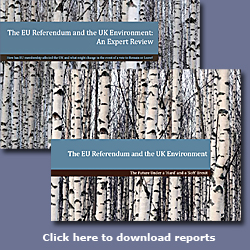 |
 |
|
Implications Of Brexit On UK Environmental Policy Study Published Theresa May's statement that ‘Brexit means Brexit’ is currently simply words, but what does Brexit mean for the environment? Whilst the media focused entirely upon the economics of a vote to leave the European Union, the scientific community was busy looking at the effects upon the UK's environmental protection legislation, future scientific expertise and the role the UK may or may not play in determining international environmental policy making. On Wednesday 21 July, three witnesses, including Prof Andy Jordan and Dr Charlotte Burns (two of the leading authors of expert reviews on UK environmental legislation) gave evidence to the House of Lords EU Energy and Environment Sub-Committee on the potential implications of Brexit on environmental policy. Their one and a half hour of presentation of their evidence to the committee, was based on their review study of the academic evidence on how EU membership has influenced UK policies, systems of decision making and environmental quality that was completed in April this year.
Following the referendum vote to leave the EU, a new study published this month (August 2016) from Dr Charlotte Burns (University of York), Prof Andrew Jordan and Dr Viviane Gravey (University of East Anglia) explores what Brexit may mean for UK environmental policies and governance processes by comparing two scenarios: a ‘soft’ and a ‘hard’ Brexit. A ‘soft’ Brexit would see the UK remain as close as possible to the EU, establishing a new relationship akin to Norway’s relationship with the EU. Conversely a ‘hard’ Brexit would see the UK trade with the EU under World Trade Organisation rules. Both will generate radically different impacts on policies, systems of governance and levels of environmental quality in the UK – key issues that should inform forthcoming negotiations to effect Brexit. The study concludes with suggestions for future research and policy. Both reports, including the executive summary, can be downloaded from the E-Library Database by selecting search category 'Environment' and using 'Brexit as the keyword. You can also learn more and monitor how Brexit developes over the next 5 years and the effects of it on environmental policies of the UK as well as accessing future reports here Source: UK In A Changing Europe Initiative |
